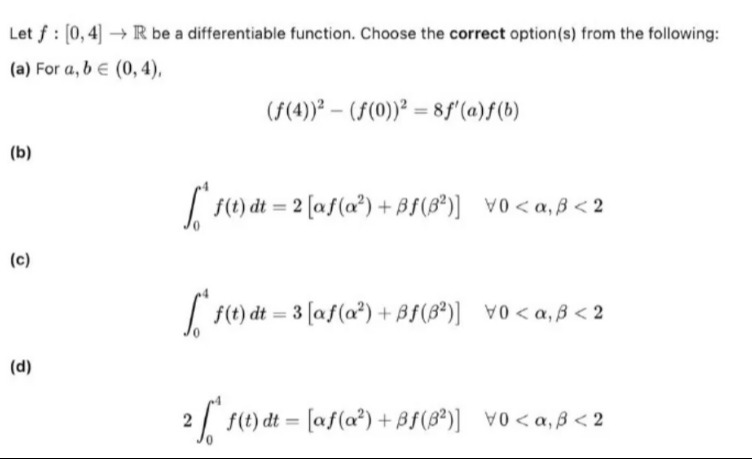Question
Question: Let $f: [0,4] \rightarrow \mathbb{R}$ be a differentiable function. Choose the correct option(s) fro...
Let f:[0,4]→R be a differentiable function. Choose the correct option(s) from the following:

For a,b∈(0,4), (f(4))2−(f(0))2=8f′(a)f(b)
∫04f(t)dt=2[αf(α2)+βf(β2)]∀0<α,β<2
∫04f(t)dt=3[αf(α2)+βf(β2)]∀0<α,β<2
2∫04f(t)dt=[αf(α2)+βf(β2)]∀0<α,β<2
(a)
Solution
Option (a):
By the Mean Value Theorem applied to g(x)=(f(x))2 on the interval [0,4], there exists c∈(0,4) such that:
g(4)−g(0)=g′(c)(4−0)
(f(4))2−(f(0))2=4g′(c)
Since g′(x)=2f(x)f′(x), we have:
(f(4))2−(f(0))2=4[2f(c)f′(c)]=8f(c)f′(c).
Thus, there exists c∈(0,4) such that (f(4))2−(f(0))2=8f(c)f′(c). Option (a) states that there exist a,b∈(0,4) such that (f(4))2−(f(0))2=8f′(a)f(b). This is equivalent to saying that for any differentiable function f on [0,4], there exist a,b∈(0,4) such that f(c)f′(c)=f′(a)f(b) for some c∈(0,4) given by the MVT.
Let Rf be the range of f on (0,4) and Rf′ be the range of f′ on (0,4). Since f and f′ are continuous on [0,4], they are continuous on (0,4). By the Intermediate Value Theorem, Rf and Rf′ are intervals (or single points).
The range of the function G(a,b)=f′(a)f(b) for a,b∈(0,4) is the set of products {xy∣x∈Rf′,y∈Rf}. This set is also an interval (or single point).
We have f′(ξ)f(ξ), where ξ∈(0,4). So f′(ξ)∈Rf′ and f(ξ)∈Rf.
The product f′(ξ)f(ξ) is a product of a value from Rf′ and a value from Rf. This product must be in the set {xy∣x∈Rf′,y∈Rf}, which is the range of f′(a)f(b) for a,b∈(0,4).
Therefore, there exist a,b∈(0,4) such that f′(a)f(b)=f′(ξ)f(ξ).
Options (b), (c), and (d):
These options are false. Consider f(t)=1. Then ∫04f(t)dt=∫041dt=4.
- (b) 4=2[α+β] for all 0<α,β<2. This implies α+β=2 for all 0<α,β<2, which is false (e.g., α=0.1,β=0.1).
- (c) 4=3[α+β] for all 0<α,β<2. This implies α+β=34 for all 0<α,β<2, which is false.
- (d) 2(4)=α+β for all 0<α,β<2. This implies α+β=8 for all 0<α,β<2, which is false.
Therefore, only option (a) is correct.
